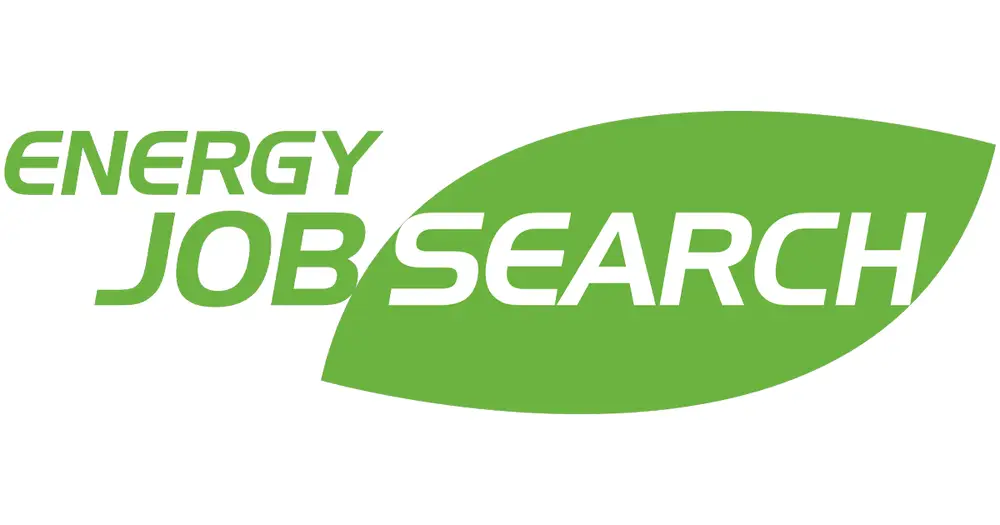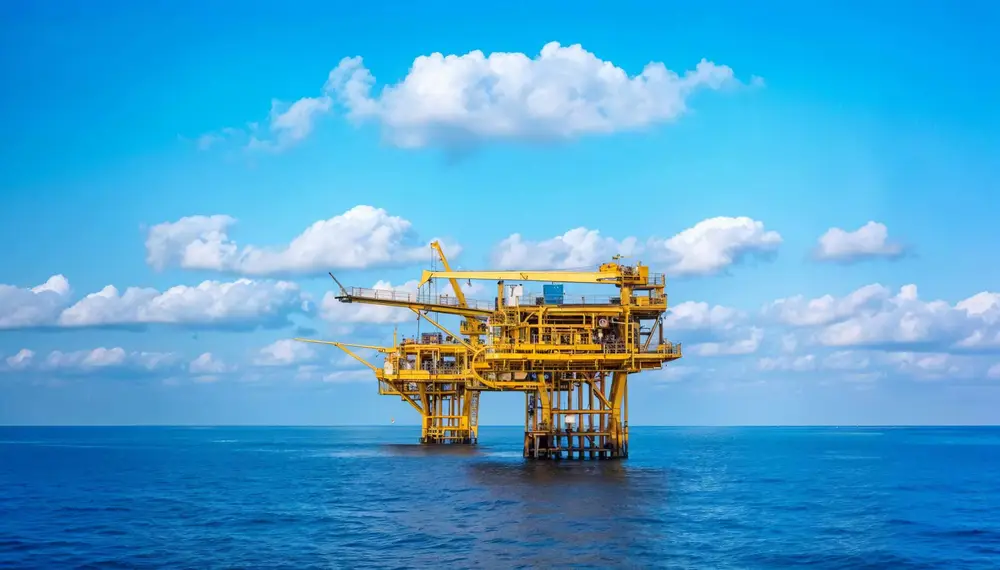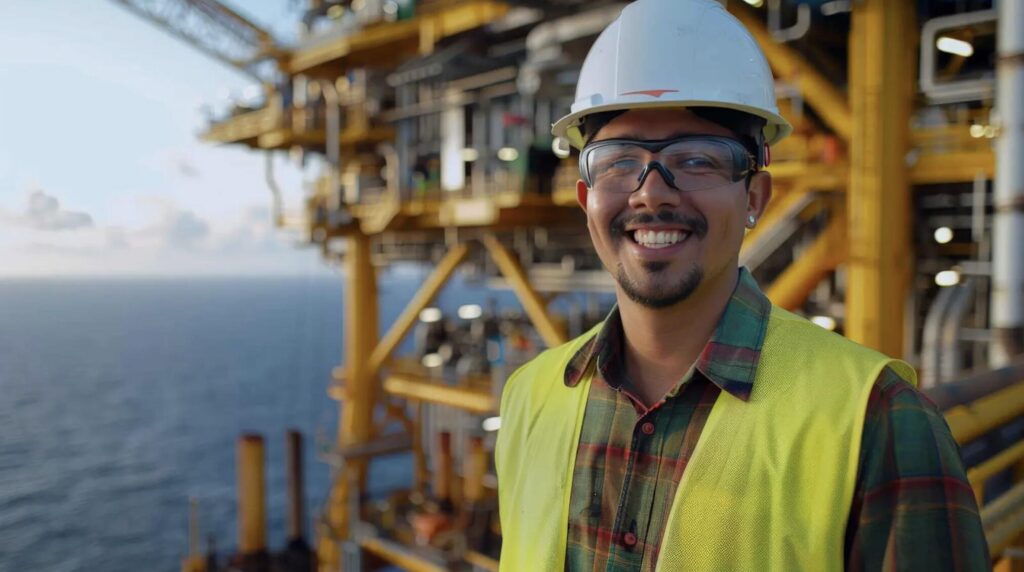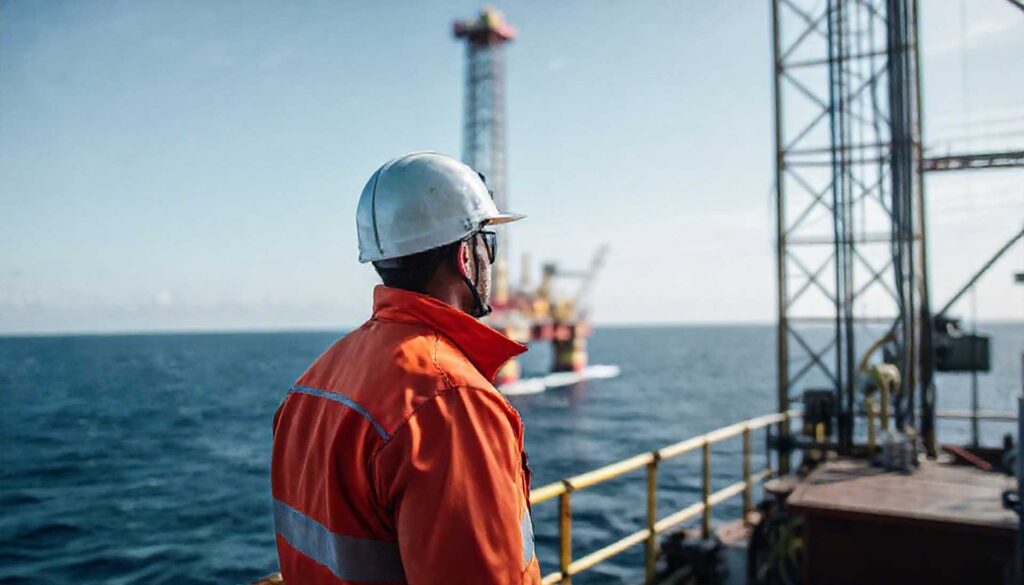Offshore platforms are essential to the oil and gas sector, providing extraction points, opportunities for data collection, and marine research.
Thanks to the range of offshore activities, there is a diverse range of jobs and roles for those looking to pursue a career in the energy industry.
From entry-level positions of floor hand to managerial positions and highly specialized saturation divers, these profiles explore oil and gas jobs with many different career paths.
Offshore Job Profiles in the Oil and Gas Sector
These job profiles offer a snapshot of the tasks and responsibilities of different offshore jobs in the oil and gas sector. This is just a sample. Titles and individual job responsibilities can vary depending on the job is location.
1. Offshore Technicians
They are also known as offshore oil rig technicians, offshore service technicians, and offshore production technicians.
This job title depends on the job requirements and will change depending on specialization requirements. If the job focuses more on servicing equipment, it becomes an offshore service technician compared to a technician focusing on drilling and production.
Offshore technicians complete various tasks depending on the rig’s needs, from daily equipment maintenance to assisting with troubleshooting mechanical and technical issues. Their goal is an oil rig that works and operates smoothly and efficiently.
The educational requirements for this job include hands-on experience working on a rig.
Technicians often move up from an entry-level position like floor hand and work toward certifications for specializations like electrical or drilling equipment maintenance.
2. ROV Technicians and Supervisors
ROV technicians and supervisors operate and manage remotely operated vehicles (ROVs) in the subsea industry.
ROVs not only work within the oil and gas sector, but also assist with construction underwater and marine research. They allow information to be gathered without endangering the safety of the crew.
This job primarily requires experience piloting ROVs, knowledge of all their systems, and an understanding of operating standards according to the project. Supervisors must also be able to lead a team, assign responsibilities, and make quick decisions in a subsea environment.
Many applicants have a bachelor’s degree in engineering, marine science, or a related field to get this job. They often get certification for ROV operations and the IMCA (International Marine Contractors Association).
3. Saturation Technicians
Also known as Saturation Divers or Sat Techs.
Saturation diving is a specialized element of commercial diving that often works for the oil and gas industry, ensuring offshore rigs’ safety. What sets this diving industry apart from other diving professions is the tasks they perform at extreme depths, far lower than traditional scuba diving.
Saturation divers earn their name by the nitrogen saturation in the body as divers stay in a pressurized environment for days to weeks and work within a pressurized diving bell.
These work sites allow them to move between surface level and hundreds of meters below sea level without needing to decompress every time and avoid potential decompression sickness.
The work involving deep-sea installations and salvage is physically demanding and can have high risks, so the role is often very well-compensated. Typically saturation technicians require two to six years of education and experience as part of a team gathering dive hours.
Divers will often work towards specializing in a particular job task or work towards a supervisory role.
4. Floor Hands
Also known as a roughneck.
An oil and gas floor hand is an entry-level member of an offshore rig crew who assists other crew members in daily activities such as setting up and cleaning. They work closely with other crew members such as equipment operators, roustabouts, and derrick hands.
Much of what a floor hand does will depend on the day and the other activities of the crew. You may be assisting with rigging one day, and mixing chemicals, and running safety checks on the next.
“Offshore rigs require a large and varied crew to operate successfully, from entry-level crew members to specialized positions requiring years of experience. “
Most of the position is learning about other positions on the platform so a willingness to learn and good attention to detail is key for the role. Understanding technical manuals and being comfortable with various machinery is important.
Becoming a floor hand doesn’t usually require anything more than a driver’s license and a high school diploma or equivalent.
5. Instrumentation Technicians
Instrumentation technicians work with the industrial instrumentation on a rig.
They are responsible for all aspects of this equipment, including repairing, maintaining, adjusting, calibrating, and installing it to industry standards.
Successful instrumentation technicians have a high school diploma, a two- or four-year apprenticeship program in industrial instrumentation repair and technology, and hands-on experience working on an offshore rig.
In addition to being responsible for instrumentation, technicians may be required to test and calibrate other equipment, such as sensors, logic controllers, and transmitters, following manufacturer requirements. Regular testing will also be required.
If you have a mind for computers, programming, and repair, this position may offer a career choice after getting an entry-level job offshore.
6. Maintenance Supervisors
Also referred to as an offshore maintenance supervisor.
This position oversees the maintenance and repair activities on the platform, including the upkeep of drilling units, support vessels, and production platforms.
They manage maintenance teams and delegate tasks to ensure all the equipment is up-to-date and minimize downtime.
Part of this role is working with safety teams to maintain compliance with offshore regulations and providing solutions when problems arise.
To become a maintenance manager, you need a background in electrical and mechanical engineering, offshore experience, and technical qualifications that certify you can supervise others. This position is a middle management position that can lead to higher leadership roles.
7. Health, Safety, and Environmental (HSE) Managers
Overseeing HSE technicians and engineers, HSE managers ensure that corporate guidelines are followed and that safety and environmental procedures are up-to-date.
This role is responsible for preventing risks by identifying areas of potential occupational risk, minimizing environmental impact, and ensuring employees’ safety while on the platform.
HSE managers also conduct audits and inspections, then organize training programs and conduct refresher courses so everyone understands HSE policies.
If you are interested in a position as an HSE manager, you should have very strong problem-solving skills, crisis management and excellent communication abilities while working within a team.
8. Equipment Operators
Also referred to as an oilfield equipment operator, heavy equipment operator, or just operator, depending on the equipment you are working with.
As an equipment operator, you set up, operate, and perform some maintenance on pressure control equipment, safety systems, or other oil and gas equipment.
You may be required to oversee deckhands and other crew members who work with equipment.
This role can be entry-level for an offshore operator with the basic requirements of a high school diploma and experience working with heavy equipment.
Most oil extraction companies provide on-site training, but previous experience can help you stand out among candidates. As a new equipment operator, you may be working with a more experienced operator to learn the smaller details of the equipment.
9. Offshore Drilling Engineers
Also known as drilling fluids engineers and petroleum engineers.
Possibly one of the most in-demand jobs in the offshore oil and gas industry. Offshore drilling engineers are usually employed on deepwater rigs in areas like the North Sea and the Gulf of Mexico.
Drilling engineers are responsible for the drilling operations that extract oil and gas. They use their petroleum or mechanical engineering education and work experience on drilling rigs to design, plan, and manage all the drilling operations on the rig.
Drilling engineers assist entry-level roles in daily drilling, playing a role in quality control and offering technical advice where necessary. This position aims to improve oil and gas extraction whenever possible and develop methods for more efficient drilling.
10. Marine and Subsea Engineers
Technology specialists who work underwater marine and subsea engineers use computer-aided design (CAD) software and 3D modeling to develop, design, and cost equipment and structures.
First, they design models and then progress to full-scale equipment like wellheads that work below the sea. They best understand the equipment and may need to provide mechanical and technical support after installation.
Marine and subsea engineers also maintain existing pipelines and drilling equipment, replacing and repairing them when necessary to ensure safety and a long operational lifetime.
This engineering job has a split working environment, with most of the time spent in an office, but some time is spent traveling or on a rig installing and maintaining equipment.
11. Rig Operators
It also includes oil and gas well drillers and service rig operators.
This entry-level role controls the operations of hoisting and drilling equipment on offshore rigs. Taking instructions from the rig manager, rig operators perform the daily tasks that allow the rig to extract oil and gas.
“Most rig operators work for extended periods on the rig in rotating shifts. “
Rig operators work independently and in a team, often assisting in installing drilling equipment while others test, monitor, and collect data about the rig.
Working conditions can depend on the rig location, and weather conditions can depend on the distance from shore and whether the platform is in deep water. Either way most rig operators work for extended periods on the rig in rotating shifts.
Although many companies require a high school diploma, direct experience offshore on a rig is the most important for the position.
12. Control Systems Technicians
An oil and gas sector control systems technician installs, maintains, and troubleshoots control systems and automated machinery. These can be electronic, hydraulic, or pneumatic systems used offshore for oil and gas production and processing.
The role is physically demanding, as are many roles on an offshore platform, and may require dealing with harsh weather and remote locations.
On a day-to-day basis, control systems technicians may need to conduct routine maintenance, troubleshoot faults or software issues, and support staff concerning systems they work with daily.
Many technicians possess an associate’s or bachelor’s degree in electrical or mechanical engineering, although practical experience is very important for this role.
This job constantly evolves as technology changes and recently began to include cybersecurity requirements and data analysis specific to the energy industry.
Conclusion
Jobs in the oil and gas sector include many different positions and specializations.
Offshore rigs require a large and varied crew to operate successfully, from entry-level crew members who help set up and clean to specialized positions requiring years of experience.
If you’re interested in employment opportunities in the oil and gas industry, the EnergyJobSearch blog can provide more information about getting a job on an oil rig without experience.











